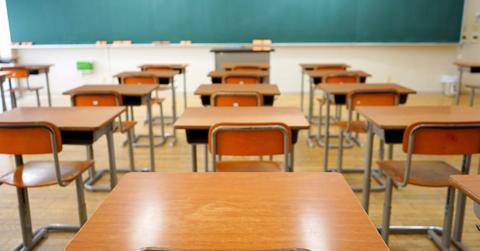
photo credit: NBC/Shutterstock
Artifical Intelligence Used In UK Schools To Track Mental Health
By Elysia JSept. 23 2019, Published 6:28 p.m. ET
A chain of Academy’s in the U.K has been using AI technology to track the mental health of its pupils.
This Is Not A Government Policy
It’s important to clarify that the move has not been adopted universally, nor is it government policy.
For background, in the U.K school system, an Academy is a state-funded school that has slightly more independence than a mainstream state school (a state school is what Americans would call a public school). The BBC has a helpful explainer on the topic. Perhaps the most important information is this: “Academies are independent, state-funded schools, which receive their funding directly from central government, rather than through a local authority. The day-to-day running of the school is with the head teacher or principal, but they are overseen by individual charitable bodies called academy trusts and may be part of an academy chain. These trusts and chains provide advice, support, expertise and a strategic overview.“
The Academies Enterprise Trust is one of the largest such chains in the U.K. It is comprised of 32 Primary Schools, 21 Secondary Schools, and 5 Special Schools. The chain has joined separate private schools in adopting the AI technology. Private or fee-paying schools also have slightly more impedance than state schools.
Rowland Manthorpe reported for Sky News that the technology is being used by some 50,000 pupils across 150 schools.
What Does the AI Do?
The technology, called AS Tracking, attempts to asses the mental health of students and flag those who may be struggling.
It does this through a test that students take twice a year. The test tells students to imagine they are somewhere comfortable. The students are then asked abstract questions (e.j. how easy is it to let someone into that space?) which are meant to ascertain the students well-being. The results are sent to the company behind AS Tracking. The company then compares the results with physiological models and flags students in need of attention. The flagging is done through using a simple red, amber, or green marker.
The tracking is said to be able to detect a pupils risk of self-harm, exposure to bullying, and likelihood of drug-use.
Once pupils leave school, they receive the data from the testing in an app. Using this, they can continue to track their mental health progress.
Pros And Cons
Dr. Simon Walker conducted studies to help develop the technology. He says that the abstract nature of the questions means that students who are unlikely to disclose specific issues to teachers can be picked up and given necessary help. Additionally, Neil Woods who is part of the Academies Enterprise Trust says that the AI has lead to a 20% decrease in self-harm in one of their Essex-based schools.
However, others have expressed concerns. Carly Kind, director of the Ada Lovelace Institute expressed concern that the AI could be used for more dubious purposes. “There is the scope for mission creep, where somebody in a school says this would be a great tool to sort children into different classrooms, or decide which students should go on to university and which shouldn’t,” she said. There is also the more general concern for pupils privacy and the risks of allowing a profit-driven cooperation control of such sensitive data.

